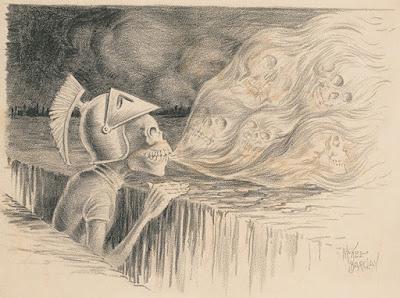Last year came to a close with an amazing series of performative forgiveness displays in the public sphere of North America. These ritualized performances tend to follow a basic pattern that is grounded in systems of privilege and power, of access and wealth.
The forgiveness rite usually moves through five steps.
1. Someone from a more powerful group does something morally abhorrent with negative consequences that primarily affect members of a less powerful group.
2. There’s a public outcry against the one who has committed the repugnant act.
3. The doer of the deed makes a (sometimes qualified) apology for the act and/or disappears from the public eye for a time.
4. The doer is publicly forgiven by one or more prominent members of a less powerful group.
5. Members of both more powerful and less powerful groups publicly shame any individuals who refuse to proffer forgiveness.
The public discussion over the interactions between George W. Bush and Ellen DeGeneres closely follows this form.
From war crimes to “partner in crime”
During his presidency, Bush led an American offensive after the September 11 attacks that featured torture, physical abuse, sexual abuse, and killing of prisoners in willful flaunting of international humanitarian laws. He promoted falsehoods in order to adjust the focus of military efforts away from Saudi Arabia (where fifteen of the nineteen hijackers were citizens) to Iraq (where major corporate donors to his campaign had oil interests). He supported a constitutional amendment against marriage equality, opposed the legalization of gay marriage, was against child adoption by members of the LGBTQ+ communities, and threatened to veto hate crime legislation that included attacks based on sexual orientation.
 |
| Poisonous Gases by McKee Barclay (c. 1915) |
Protests against the Iraq War began in 2002 and continued throughout Bush’s time in office. The march outside the 2004 Republican National Convention was one of the largest in United States history, and the international protest in February 2003 entered the Guinness Book of World Records as the largest anti-war rally in history. Nearly one million protestors gathered in London’s Hyde Park alone. In the wake of Bush’s anti-LGBTQ+ actions and statements during his first term, even the members of the Log Cabin Republicans (“the nation’s original and largest organization representing LGBT conservatives”) abandoned him. The group’s board voted 22-2 against endorsing him for re-election.
After leaving the White House, Bush largely stayed out of the national discussion. He focused on writing his memoirs and painting portraits of people and dogs. He defended the use of torture under his leadership and said there was no need to apologize for misleading the public in order to advance a military offensive that led to 250,000 civilian deaths in Afghanistan, Iran, and Pakistan even as 4,200 U.S. service members gave their lives. He clearly took the disappearing option over the apology option.
Bush’s rehabilitation began when Michelle Obama began kidding around with him at public events. She called him her “partner in crime” and “a wonderful man,” saying that she “love[s] him to death.” Public forgiveness reached a tipping point when photos of Ellen DeGeneres having a great time with the former president at a football game went viral on social media in October. The comedian responded to online comments by performing a monologue on her television show stating that she and Bush are friends. She insisted that she is “friends with a lot of people who don’t share the same beliefs” and advised her audience to “be kind to everyone.”
After the first African-American First Lady and the television star who jumped over so many media hurdles set up against LGBTQ+ performers both publicly gave George W. Bush their love and kindness, how dare anyone else hold on to past grievances? My various social media feeds were flooded with posts from people across the political spectrum celebrating the healing qualities of coming together across the aisle and recognizing the inherent humanity that we all share, of setting aside differences of opinion and being friends with those who don’t subscribe to every element of our own personal belief systems, and – most importantly – forgiving mistakes of the past in the interest of building a kinder community in the present.
We all make mistakes, don’t we? How can we judge others and hold them to account for their past errors when each of us has our own trail of missteps? Comments like these are common in these discussions of forgiveness and calls for all of us just getting along.
What is the root of this distinctly American forgiveness philosophy? I believe it springs from Christian concepts of sin and forgiveness. Christ teaches that we should not judge others, lest we be ourselves judged. He insists that only the one who is without sin can condemn the sins of another. He instructs his followers to forgive any who wrong them, if the wrongdoer repents. Indeed, the idea of repenting resulting in forgiving is core to the Christian worldview.
Embracing the murderer
This worldview was on display in the courtroom after former Dallas police officer Amber Guyger (a white woman) was found guilty of murder and sentenced to ten years in prison for killing her neighbor Botham Jean (a black man) in his own apartment. The brother of the murder victim and Judge Tammy Kemp both hugged the convicted killer. The brother mentioned God’s forgiveness. The judge gave Guyger her own personal Bible and cited a passage on salvation. Both the brother and judge are African-American. As in the case of Bush, members of the group victimized by the offender made a public show of forgiveness after the appropriate apologetic speech act – in this case tearful and regretful testimony on the stand.
 |
| The Promise II by Madeline von Foerster (2012) |
This forgiveness metric is not necessarily embraced by those outside the American Christian sphere. While teaching a college course on religion and social movements, I told the students about my experiences hearing a Christian gospel singer repeatedly testify in various churches about his past as a drug dealer, about finding Jesus, about repenting his wicked ways, about asking Christ for forgiveness, and about being transformed by the love of the Lord. A student from India asked why the singer wasn’t arrested after confessing his crimes in a public setting. No matter how I explained that this is a standard narrative put forward in evangelical settings, the student was shocked that openly talking about crimes that went unpunished by civil authorities was considered a positive act in a religious setting.
Given this student’s response, I’m always a bit surprised when I see American practitioners of Ásatrú and Heathenry repeating the mantra of repentance and forgiveness. So many times, I’ve witnessed proud followers of the Old Ways evince worldviews that seem grounded in American Christian teachings. The idea that those who perform speech acts declaring repentance for past sins should be forgiven and embraced appears regularly when issues of politics (or things declared to be “political”) come up in social and social media settings.
Person X was a neo-Nazi for ten years, but he says he’s not anymore; he’s welcomed into a self-declared “inclusive Heathen” community. Person Y was a prominent leader in a hate group on the SPLC watchlist, but says she regrets it; she’s given a position of authority in a supposedly non-racist Heathen organization. Person Z has repeatedly and publicly insisted that the swastika and Black Sun are true symbols of Heathen pride, but now says they’re sorry; they’re hailed for their bravery. Anyone who questions the forgiveness process is accused of “inserting politics” or being against “inclusion.” Never mind that the objects of forgiveness are always white and the actions being forgiven always have to do with whiteness.
Does the confluence of speech act and forgiveness mark any real change in the person? Less than three weeks after the orgy of explicitly Christian forgiveness that followed Amber Guyger’s tearful testimony, the killer cop’s lawyers filed paperwork to get the ball rolling on appeal of both the murder conviction and the prison sentence. Those who have experienced the benefits of privilege don’t seem willing to face any consequences of their deeds beyond the forgiveness ritual – a ritual that so often displaces and negates any actual requirements of restitution.
Deeds, wyrd, and public theology
Is there anything in Heathen theologies that applies to these situations? The American Heathen credo “we are our deeds” and the concept of wyrd can offer some guidance here. If we truly are our deeds, and if what is done in the past and present determines what must happen in the future, then harmful action must be balanced and countered by helpful action.
 |
| The Norns and the World Ash Tree by Emil Doepler (1905) |
Decades of hateful action in the service of white nationalist ideology are not somehow erased by a post apologizing to an all-white Heathen Facebook group. Odin does not say, “Cattle die, kinsmen die, but the one thing that never dies is that one apologetic comment made after being accepted into an un-vetted Facebook group actively seeking to boost its membership numbers by any means necessary.” How many years has that neo-Nazi or Bush or Guyger dedicated to building up the specific communities they spent so long tearing down? How much energy have they dedicated to making restitution to those that they harmed, rather than making self-serving statements within their own social spheres?
Part of the problem here is the issue of who is simply forgiven after taking a brief time out form public life or performing a basic public apology. After being caught out for three specific instances of wearing blackface and saying he wore it so often that he can’t remember how many times he did it, Liberal Party leader Justin Trudeau was re-elected as the prime minister of Canada. After multiple credible allegations of sexual abuse, Louis C.K. temporarily hid from the cameras before re-emerging in New York clubs as a performer. Do those without power and privilege receive the same forgiveness benefits?
While Trudeau brushes past the blackface issue, indigenous Canadians are imprisoned at disproportionate rates and receive incredibly harsh treatment while incarcerated. While wealthy investors move into the growing legal marijuana market in the United States, African-Americans are arrested and sentenced for marijuana use out of all proportion. While Harvey Weinstein sits in the audience at Manhattan’s Downtime bar as his team of lawyers prepare for his rape trial, comedian Kelly Bachman – a rape survivor herself – is booed for addressing the allegations against him, and actor Zoe Stuckless is escorted out of the event after confronting the Hollywood mogul. While black women are jailed for defending themselves from chronic sexual assault, wealthy athletes are protected from facing consequences for repeatedly committing domestic abuse.
There is an endless list of these examples, of the privileged being granted forgiveness while their victims are denied it. Reading the news stories, and seeing the reactions from American Heathens, I have to ask: should today’s Heathen religions be based on concepts of Christian forgiveness and on practices of punching down at the less privileged? As far as I’m concerned, the answer is no.
I believe that Old Icelandic poetry and Norse mythology are valuable as materials to be meditated upon, as records of ancient insights that can help us find our own insights into the problems of today. The texts that we spend so much time studying and reflecting upon do not provide narratives that follow the forgiveness process outlined above. To the contrary, they strongly emphasize the doing of deeds that benefit the community, the facing of consequences for harmful action, and the protection of those who are in danger from harmful forces.
My own Ásatrú worldview is grounded in a public theology* of standing up to hate as Thor stands up to the serpent that threatens the world, of facing down those who threaten our communities as Tyr faces down the growing danger of the monstrous wolf. The powerful ones who are willing to abuse the world for their own gratification do not deserve a forgiveness that is free of consequences. They do not merit an embrace without balancing their wyrd through equivalent right action and restitution to those harmed. This goes for past presidents as much as it does for the supposedly renunciant racists who seek entrance into our Heathen spaces online and off.
The next time this forgiveness narrative plays out, we would do well to reflect on our own reaction to the formula and participation in the ritual. We would benefit from asking ourselves if our religious traditions foster a fundamentally different perspective on the drama than the ones which surround us. If they do not, do our traditions really offer worldviews that are meaningfully distinct from that of the dominant culture?
__________________
* As defined by Korean theologian Sebastian Kim, public theology addresses the growing “need for theology to interact with public issues of contemporary society” and to “engage in dialogue with different academic disciplines, such as politics, economics, cultural studies and religious studies, as well as with spirituality, globalization and society in general.”
An earlier version of this article appeared at The Wild Hunt.








